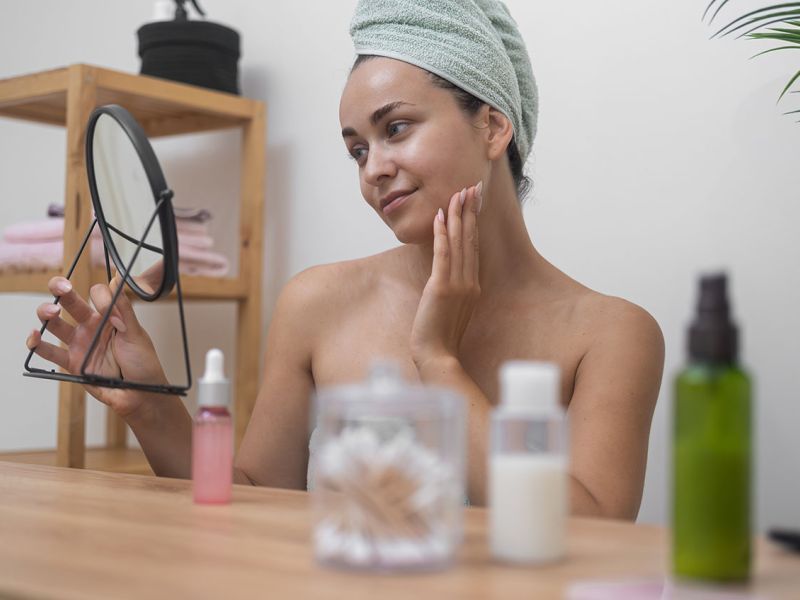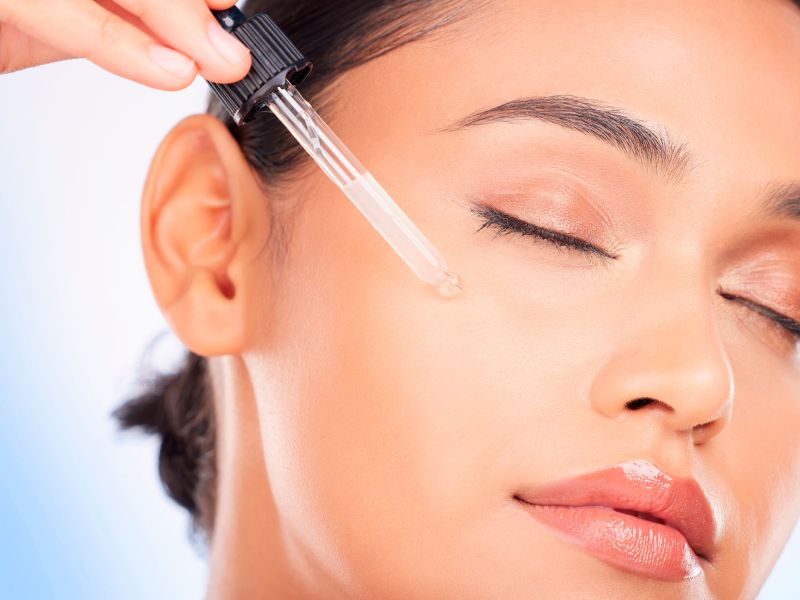Skincare Care Routine For Acne Prone Skin

Having acne-prone skin can be a challenging journey, but it doesn’t mean you should skip essential skincare steps like moisturizing and using sunscreen. In fact, a well-thought-out skincare routine can help manage acne while maintaining overall skin health. In this article, we’ll explore whether you should stop using moisturizers and sunscreen for acne-prone skin and provide a comprehensive skincare routine tailored to your needs.
Moisturizers and Acne-Prone Skin:
Contrary to popular belief, moisturizers play a crucial role in managing acne-prone skin. Using a suitable moisturizer helps maintain the skin’s natural barrier, preventing it from becoming too dry or irritated. Opt for oil-free, non-comedogenic moisturizers that won’t clog pores.
Skincare Routine for Acne-Prone Skin:
1. Cleanse Properly:
Start your skincare routine with a gentle, non-comedogenic cleanser twice a day. Cleansing helps remove excess oil, dirt, and impurities without irritating the skin. Consider cleansers with salicylic acid or benzoyl peroxide for their acne-fighting properties.
2. Be Gentle:
Avoid aggressive exfoliation, as it can worsen acne by causing inflammation. Use gentle, circular motions with your fingertips or a soft washcloth when cleansing. Skip abrasive scrubs that can irritate acne-prone skin.
3. Moisturize Regularly:
Apply an oil-free, non-comedogenic moisturizer to keep your skin hydrated. Even if you have oily skin, maintaining proper moisture balance is crucial for overall skin health.
4. Use Non-Comedogenic Products:
Choose skincare and makeup products labeled as “non-comedogenic” to prevent pore clogging. This helps reduce the risk of new breakouts and promotes clearer skin.
5. Sun Protection:
Apply a broad-spectrum sunscreen with SPF 30 or higher every morning, regardless of the weather. Sunscreen protects your skin from harmful UV rays and prevents worsening of acne scars and post inflammatory hyperpigmentation.
6. Avoid Touching Your Face:
Resist the urge to touch or pick at your acne-prone skin. Doing so can spread bacteria, worsen inflammation, and lead to more breakouts and potential scarring.
7. Be Careful with Makeup:
Opt for oil-free, non-comedogenic, and fragrance-free makeup products. Remember to remove your makeup thoroughly before bedtime to prevent pore clogging.
8. Limit Exposure to Irritants:
Steer clear of skincare products containing alcohol, artificial fragrances, and harsh chemicals. These can irritate the skin and exacerbate acne symptoms.
9. Hydrate and Eat a Healthy Diet:
Stay well-hydrated by drinking plenty of water to support your skin’s health from within. Maintain a balanced diet rich in fruits, vegetables, and whole grains, and be mindful of any dietary triggers that may worsen acne.
10. Consult a Dermatologist:
If your acne persists or causes distress, consult a dermatologist. They can provide personalized treatment options, including prescription medications or procedures, based on your skin’s specific needs.
11. Patience and Consistency:
Skincare results may take time, so be patient and consistent with your routine. Stick to the products that work for you, and don’t be afraid to adjust as needed. Patience and Consistency is key for solving any problem and it is a must while treating your acne as well. If you’re constantly stressing out about your acne then it directly/ indirectly causes your skin to have acne outbreaks.
Acne-prone skin requires a thoughtful and consistent skincare routine. Moisturizing and using sunscreen are not only safe but essential steps in maintaining healthy skin. By following a tailored skincare routine and consulting with a dermatologist when needed, you can manage acne effectively and achieve clearer, healthier skin over time.
Other Recent BLogs
-
 Skin Care for All Seasons, Adjusting Your Routine to Weather’s Whims
Skin Care for All Seasons, Adjusting Your Routine to Weather’s Whims -
 The Role of Stress in Skin Health: Managing Your Complexion in High-Pressure Times
The Role of Stress in Skin Health: Managing Your Complexion in High-Pressure Times -
 Understanding the Differences Between Teen and Adult Acne: A Guide from Elara
Understanding the Differences Between Teen and Adult Acne: A Guide from Elara -
 Should I Stop Using Moisturizers and Sunscreen Because I Have Acne-Prone Skin? Skincare Routine for Acne-Prone Skin
Should I Stop Using Moisturizers and Sunscreen Because I Have Acne-Prone Skin? Skincare Routine for Acne-Prone Skin -
 Skincare Care Routine For Acne Prone Skin
Skincare Care Routine For Acne Prone Skin -
 Salicylic Acid Treatment For Acne
Salicylic Acid Treatment For Acne -
 Understanding Acne And It’s Treatment
Understanding Acne And It’s Treatment -
 Chemical Peel vs. Carbon Peel: What’s The Difference?
Chemical Peel vs. Carbon Peel: What’s The Difference?









